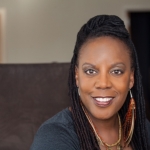
Glenis Redmond
Find the Good and Praise It
Posted by Sep 12, 2016 0 comments

Glenis Redmond
Alex Haley, the author of “Roots,” wrote, “Find the good and praise it.” Who knew that at age twelve, I would be on a journey to follow his instructions? Who knew that the answers would stem from an English class at Woodmont Junior High School? My journey as a poet began when Ms. Sergeant commanded, “Class, you are going to write in your journals for fifteen minutes every morning.” The only thing I was sure of was on that day, I protested loudly about her writing assignment. The last laugh was on me, because when I put pen to paper, a fire started within me. Yet, at Erskine College, I studied Psychology instead of English. Though I loved the field of counseling, I finally left it after eight years to pursue poetry.
In 1993, I became a practicing poet and Teaching Artist in the state of South Carolina. Who knew what I wrote as a thirty-year-old woman was in the same vein as my twelve year old self? Unbeknownst to me in middle school, I was writing a form of poetry that had a long tradition: praise poetry. Praise poetry is a type of tribute in which the poet either writes about self or others literally and metaphorically addressing heritage, height, personality, nature, passion, and how they walk in the world.
My classmates would stand in line and wait for me to take their poetic inventory. I’d go home and return in a few days with a poem that honored them. I was busy doing what Haley commanded, “finding the good and praising it.” Simultaneously, members of my church family at Bethlehem Baptist Church called upon me to deliver elegiac poems when someone died. It did not matter that at 4 feet 9 inches, I could barely see over the pulpit. With my poet’s voice I was armed with both purpose and praise.
I did not write my first formal praise poem until I was in my thirties.
New Wings
I am a Daughter of the Dust.
I am a true Sister of the Yam.
I come from a long line of serious brown women
that don’t take no mess or apologize for living.
I am birth from the morning earth
deep, rich and free.
Gale my middle name
describes how I move in this world
sometimes gracefully other times stormy.
Glenis, welsh for valley.
I have dwelt there far too long.
I am 5 ft. 3 of Cosmic Blackness
I am a raven
I am a crow.
I am a nappy bat.
I am a mosquito.
Call me anything black
that has wings
and
flies.
This literary investigation was medicine. It was a creative way for me to investigate my lineage. I was on a quest to discover who I was. Like most African-Americans, slavery was an impenetrable wall that I hit when researching my familial history. In 2005, science and technology made it possible for me to deepen my search. DNA testing allowed me to discover exactly where my family originated. I discovered that my mom’s side came from Cameroon and my dad’s side originated from Nigeria. While writing an essay at Warren Wilson’s MFA program for poetry, I discovered Judith Gleason’s book, “Leaf and Bone: African Poems.” There she proclaims that Nigerians were the chief praise poets of Africa. This explained my deep reverence for praise poetry. My 12-year-old self knew something precious and wise; she stood in line with ancient ancestry. In West Africa, I would have been deemed a griot, a roving poet. In America, I took up the title of Teaching Artist, teaching poetry to students and teachers.
In 2014 I wrote a persona praise poem in the voice of David Drake, an enslaved potter poet from Edgefield, South Carolina.
At the Peace Center, I run a program called Peace Voices, a space for adults and teens to read, write, and perform poetry. Praise poetry is an introductory lesson that I teach to all my students to help them strengthen their poetic voice. Below is a praise poem by Lili Campbell. I taught her in eighth grade at League Academy. She quickly became one of our Peace Voices Poets. Here is first praise poem titled “Infinite.”
I am mindful, Praise Poetry seems simple, but can be quite difficult, when the command is to find the good. For some this instruction rides against how they were raised. They were told not to boast. Some find difficulty in affirming themselves. However, praise translates differently in many West African tongues. It actually translates into the word tendon. Therefore, the instruction is to connect. Find connections with yourself and the rest of the world. Lili is now a senior. Here is another one of her autobiographical poems:
In “I am a Mathematician,” you witness how Lili’s poetic voice has changed. It has expanded and deepened as a senior. It is long walk from her poem “Infinite” to her poem “I am a Mathematician.” She veers away from praise, but she is still on a quest of discovery and claiming her self-identity. Lili stands up in this poem, and I find myself standing up with her. My response to her is: “Fight.”
As a teaching artist, I believe my role is to pass the poet’s pen as it was passed to me in the 8th grade, hoping my students will take the pen and right/write their lives.
Ultimately, my goal is for them to do as Haley commanded (even if it is hard won): “Find the good and praise it.”
